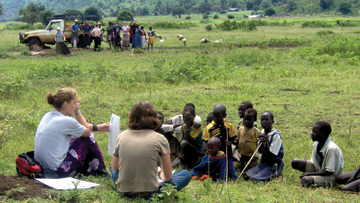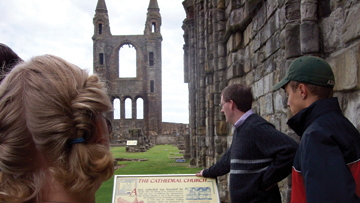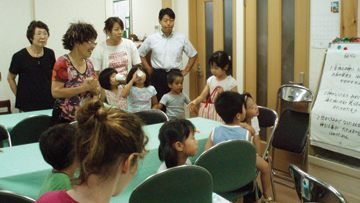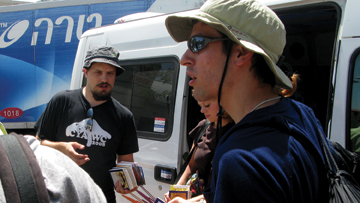You have free articles remaining this month.
Subscribe to the RP Witness for full access to new articles and the complete archives.
Growing up in the Winchester, Kan., RP Church, I was blessed from an early age to be surrounded by godly examples of Christian faith—from a loving family who instructed and modeled lives of Christian love and service, to those in the congregation who taught me about Christ and to apply His Word.
One of the greatest blessings was that I was able to form strong relationships with many pastors who retired in that little town (Paul White, Wylie Caskey, Howard Elliott, and Bob Tweed). These men went out of their way to befriend, challenge, and mentor me in my formative years. Each one brought certain strengths and insights and created within me a great appreciation for the blessings to be found in a life of service to Christ.
As I headed off to college, the church continued to foster my growth. When a group of RPs ended up attending Kansas State University and wanted to form a Bible study, the Midwest Presbytery went out of their way to encourage us. Pastors from across the presbytery traveled to the campus to lead occasional studies, gave counsel to us as we labored to prepare our study each week, and helped to ensure that the lessons were solid and faithful to God’s Word. We marveled at the financial support that came from members of the presbytery to help us take our group to presbytery youth retreats and conferences.
As time went on, the things I had appreciated at the congregational and presbytery level were demonstrated at the denominational level as well. In 1995, after much persuasion from friends at Sterling College, I went on my first mission trip—to St. Petersburg, Russia. This trip opened my eyes to the vastness of Christ’s kingdom and the opportunities He affords His people to proclaim the gospel.
While I learned much in that effort, I also noted many weaknesses that could be best addressed by seeing the work of missions carried out under the umbrella of the Church. The RPCNA Foreign Mission Board agreed, and, under their oversight, RP Missions was born. In 1997, having communicated via lengthy faxes to Pastor Andrew Quigley in Airdrie, Scotland, the lessons I learned from my trip to Russia were about to be implemented in the first RP Missions trip to Scotland.
The Building Blocks of RP Missions
RP Missions works only with established Reformed churches. This allows team members to explore opportunities that exist within the church to serve Christ and to do so while enjoying the oversight and counsel of the local pastors and elders. In part, this is a way for participants to grow in their appreciation of the leadership that Christ provides His Church. Short-term missionaries come to the field with a desire to serve and be useful for Christ. The leadership of the church offers direction and security to the participants as they venture into the community and attempt to overcome Satan’s tool of fear.
RP Missions operates from an unapologetically Reformed perspective. At the time that RP Missions sent out its first team, there seemed to be two competing views in the church as it related to Reformed theology. The first held that Reformed theology was a fine exercise of the mind, but had not been or could not be effectively implemented in the realm of missions or church planting; thus a broader evangelical approach ought to be attempted. The second view embraced Reformed theology but feared the corrupting influence of “the world,” so interactions with the world were limited—in essence, building up a hedge trying to survive.
By laboring with Reformed churches, the teams enjoy foundational support from the local pastor and sessions without being fearful of the world. Over the years, it has been exciting to see what had been an almost apologetic position for being Reformed Presbyterians being replaced by a greater confidence in God’s Word and the assurance that Reformed theology naturally emerges from a right understanding of His Word. This wasn’t a boastful confidence, but one that, through the discipling of these host pastors and elders, was tempered with love and compassion and that was being applied in a winsome manner. This growing appreciation of Reformed theology was giving courage to the participants and impressing upon them that the treasure they had been given is most needed in all communities of the world.
RP Missions welcomes team members from inside and outside the RPCNA. Through years of presbytery retreats and conferences, I had witnessed the way God had impressed His Word and the Reformed understanding of His Word upon those from outside the denomination and even outside the greater Reformed community. It was important to continue this with the missions program. What we found was that the opportunities for RP youth to answer the many questions that were raised by those new to our little denomination provided even more training for the participants, as they sought to recall what they had been taught and direct their newfound friends to the answers found in God’s Word. Once again, the value of working with established churches and pastors and sessions was demonstrated, as participants could seek assistance from those church leaders as they sought to give an answer. Not only would God provide opportunities to explain practical applications of Reformed theology to team members, but, over the years, the commitment to God’s Word and Reformed theology has been responsible for a great number of invitations from other Reformed denominations to come and labor with them.
We have considered it a great privilege to be invited to labor with our brothers and sisters from the Presbyterian Church in America, Orthodox Presbyterian Church, Associated Presbyterian Church, Greek Evangelical Church, Reformed Baptist Church, and various RP denominations around the globe.
RP Missions focuses on outreach first, and manual labor second. Many mission agencies put most of their efforts into practical work, or manual labor, building houses, hospitals, orphanages, schools, walls, etc. I had heard several missionaries in the field speak of the limitations of short-termers doing skilled work, and that sometimes the work accomplished by one team is then demolished so that the next team can attempt the project all over again. One of the challenges of mission efforts that are primarily focused on the physical projects is that they can give a false understanding of what ministry is really like. They give the participant the idea that once a need has been identified it can be quickly accomplished. However, in the realm of evangelism and discipling, this is very rarely the case. So RP Missions seeks to be utilized by the host congregations primarily for outreach purposes. Again, the fact that these young people are working shoulder to shoulder with pastors and elders allows them to hear the stories and witness the time it takes to build relationships, present the gospel, teach from God’s Word, and mentor young Christians in the faith. Rather than participants being disappointed that they can’t return home talking about the work accomplished, it tends to excite them to remain in contact and to return again to see how the work begun is being continued year after year.
Serving the Church
God has provided many opportunities for His people to serve. Since 1997, RP Missions has received invitations from churches of various conditions, sizes, and locations and with a variety of needs. One of the benefits of being able to offer a number of different opportunities is that we can better meet the needs or interests of those prayerfully considering where God would have them serve. We now have opportunities to explore missions in First World to Third World countries, in rural, metropolitan or urban areas, in church plant efforts or church revitalization efforts, domestic and international. We can match skills with areas of need and hopefully become of greater value to the work of our host congregations and the Church at large. It has also been a great joy to be able to identify pastors willing to take on seminary students to lead RP Mission teams and satisfy their pastoral internships.
It is our hope that those who participate on a mission team will return home with a number of new tools and a greater measure of courage and confidence to be even more active in their local church and community. In the fall, RP Missions hosts a missions debriefing weekend conference in Beaver Falls, Pa. It is encouraging to hear from those who have returned home and found ways to implement the lessons God taught them earlier that year on the field. Some have returned to instruct members of their home church in evangelism techniques and have helped to establish new outreach efforts in their congregations. Still others have returned home and been used of God to see their churches become more aware of the work of missions currently underway through this denomination. They have impressed upon their friends and families the great need for prayer to uphold these works and those laboring in them. Several former team members who served in Airdrie, Scotland, have returned home with a heart for discipling and have implemented programs similar to the Mutual Encouragement Times (MET) utilized in Airdrie to develop stronger devotional practices.
As RP Missions continues to grow and develop, we are currently exploring the ways we can provide opportunities for adults, families and retirees to use their skills on the short-term mission field. This year we have opportunities for skilled construction laborers to help in Israel with the construction of a new church building and also to do some street evangelism. Since most working adults don’t have a month of vacation time to devote to one of our longer trips, we have added some one- and two-week options. One of our summer options this year is a mission to St. Louis, Mo. This team will be working with Pastor Ray Morton and others currently involved in a Bible study on the east side of St. Louis. This team will help to canvas the communities on that side of town with the hopes that a church plant can be established.
From Short-Term to Long-Term Missions
RP Missions was never intended to be the climax of a young person’s service to the church, but rather the beginning. Since the program began, we have seen 16 team members go on to longer-term missionary service.
Beth Bogue, who was on the first two mission teams to Airdrie, Scotland, responded to the need for a secretary in the Airdrie church and moved to Scotland over ten years ago. She is still working in that capacity today and works to raise her own salary so as not to burden the church.
Responding to a need for workers in that same church, Rob and Jessica Edgar (who have since returned home) and Karen Reyburn moved to Scotland. They found jobs to support themselves but became active members in the church. Brandon and Megan Fisher did the same thing in Australia after a trip there. Valerie Swigart participated on a domestic mission to Laramie, Wyo., to help with a church plant effort. She so enjoyed the prospect of that work that she even changed schools to become a more permanent part of the work in that part of Christ’s kingdom. Over the years RP Missions has been blessed to enjoy an amazing return rate (those who go on a mission trip and go back again and again). This has enabled RP Missions to grow and for us to see these veterans take on greater levels of responsibility and grow in their appreciation of the work of missions. Heather Huizing was a regular participant in RP Missions for several years. Each year God kept opening doors that eventually led her to become a full-time missionary in Sudan. She has been joined by another RP Missions couple, Daniel and Natalie Faris, who also spent several summers laboring with RP Missions and developing the tools that now are being used in diaconal/practical work in Sudan.
Supporting the Work
In what ways can you help to support the work of RP Missions in the coming years? First, please pray for those former participants who are seeking the Lord’s guidance as they contemplate longer-term mission service. Pray that God would grant them wisdom as they seek to identify needs across this denomination and throughout Christ’s kingdom, and as they seek to evaluate their skills and gifts to aid in the work of Christ’s churches. Pray for these congregations who year after year are opening their homes, ministries, and hearts to these teams so that these participants might grow in their appreciation of the complexities of ministry and the joys to be had in the service of Christ.
Join with us in giving thanks for the way that pastors, elders, deacons, and other church workers are inspiring a new generation of Christian servants. Give thanks to God for a new generation that is modifying their priorities so that they are first seeking the places they can best serve their Lord and accentuate the work of His church. Give thanks for the agencies of this denomination (RP Seminary, Geneva, RP Home, Education & Publication, RP Global Missions, Home Missions, etc.) who are encouraging Christian servants, equipping them, and enabling them to pursue lives of service to Christ. Join with us in giving thanks to families that are steeping their children in God’s Word and practicing family worship, and for churches that are taking seriously their responsibilities to train up their youth and who have demonstrated the loving church family to visitors, new members, and covenant children.
Please continue to promote the work of RP Missions by helping to identify those who demonstrate a “servant’s heart.” Encourage young and old alike to discover areas where they might continue to develop their skills and develop new skills for the strengthening of Christ’s Church. Support in prayer these participants, the hosts, and those who God raises up to financially support the work of outreach in each of these areas.
—Matt Filbert
Matt Filbert is the director of RP Missions. He is a ruling elder of First RPC of Beaver Falls, Pa.



